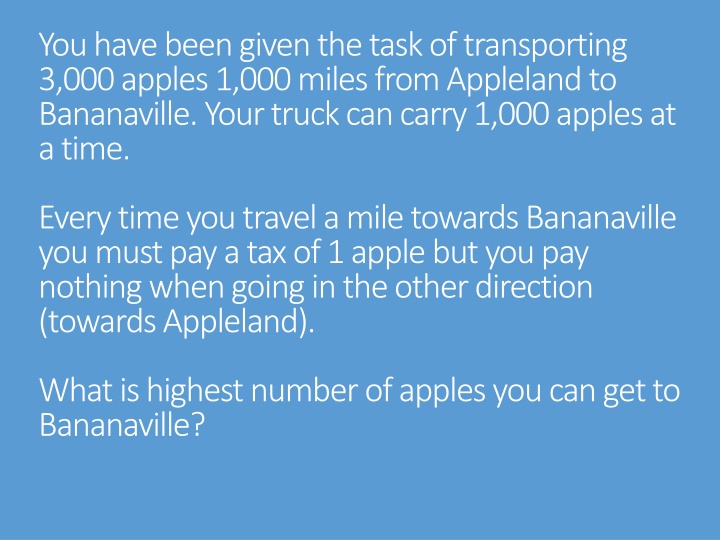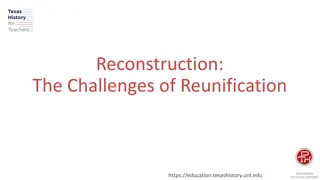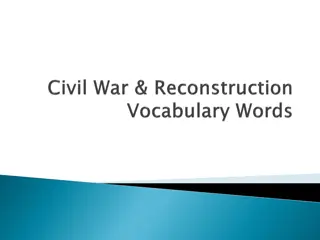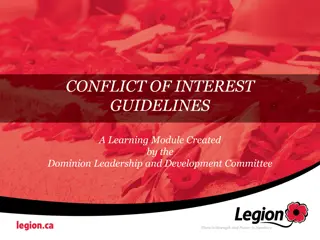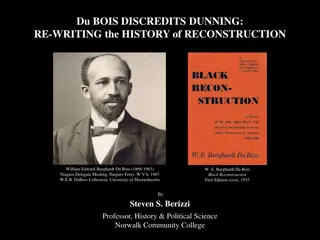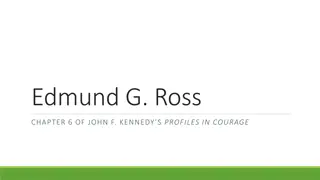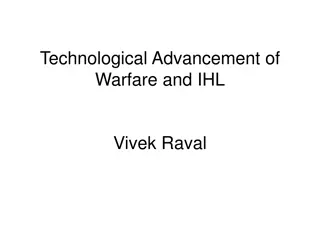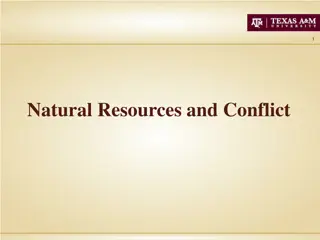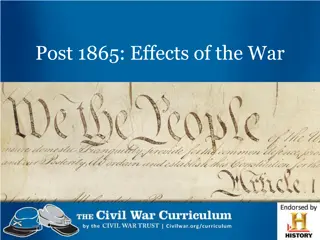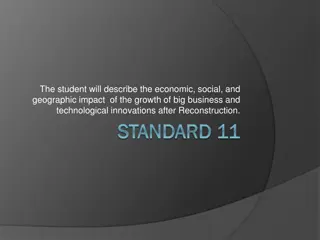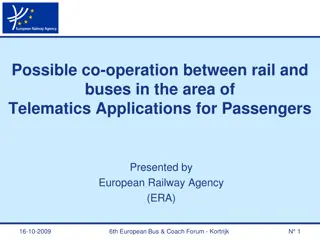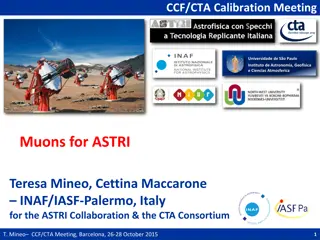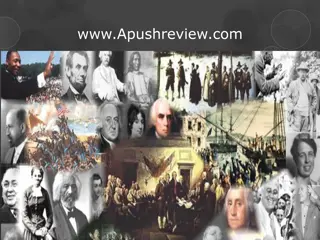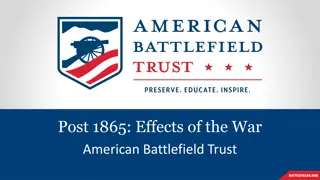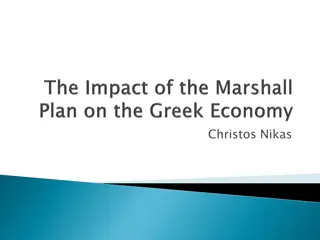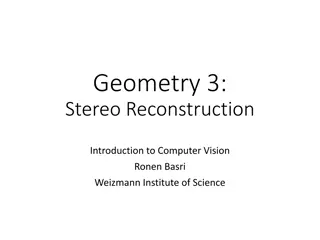Analysis of Reconstruction Era Policies and Conflicts
The content discusses the challenges and conflicts during the Reconstruction era in the United States following the Civil War. It covers topics such as the presidency of Andrew Johnson, the actions of Radical Republicans, the impact of Black Codes on African Americans, and the conflict between Johnson and Congress. Various policies, such as Presidential pardons and the impact of the conflict on Reconstruction, are explored. The content delves into key events, such as Johnson's impeachment and significant legislative actions during this period, shedding light on the complexities of post-Civil War reconstruction efforts.
Download Presentation

Please find below an Image/Link to download the presentation.
The content on the website is provided AS IS for your information and personal use only. It may not be sold, licensed, or shared on other websites without obtaining consent from the author.If you encounter any issues during the download, it is possible that the publisher has removed the file from their server.
You are allowed to download the files provided on this website for personal or commercial use, subject to the condition that they are used lawfully. All files are the property of their respective owners.
The content on the website is provided AS IS for your information and personal use only. It may not be sold, licensed, or shared on other websites without obtaining consent from the author.
E N D
Presentation Transcript
You have been given the task of transporting 3,000 apples 1,000 miles from Applelandto Bananaville. Your truck can carry 1,000 apples at a time. Every time you travel a mile towards Bananaville you must pay a tax of 1 apple but you pay nothing when going in the other direction (towards Appleland). What is highest number of apples you can get to Bananaville?
1. When did Andrew Johnson become President? Quiz 2. Recall one limitation that the Black Codes put on African Americans. 3. How did Congress react to the Black Codes? 4. What does it mean if Congress passed something over President Johnson s veto? 5. What is the importance of Republicans capturing 2/3 of both Houses of Congress? 6. Name one law passed to restrict presidential powers. 7. Why was Johnson impeached?
By the end of this lesson, everybody will be able to Understand the positions of Johnson and Radical Republicans Judge the VALUE of sources on this topic which was the better method for reconstruction the impact of the conflict between Johnson and Congress
Eric Foner Failure of Presidential Reconstruction Paragraphs 1 and 2: Paragraphs 1 and 2: 1. What was Johnson like as a man? 2. How did this impact his Presidency? Paragraph 3 onwards: Paragraph 3 onwards: 1. Highlight key aspects of Johnson s view/ actions on Reconstruction 2. What impact did Johnson s actions have on Reconstruction: short term, long term
May 29th 1865 July 4th, 1868 Amnesty (restoration of property except slaves) to former Confederates who pledged loyalty to the Union and support of Emancipation. 14 classes of Southerners (Confederate officials with taxable property of $20,000) had to apply individually for Presidential pardons Extended clemency to those high-ranking official who had been excluded from earlier proclamations People under indictment are still excluded September 7th 1867 December 25th 1868 Reduced the expected classes to those who held high rank in the Confederacy, mistreated prisoners or were under indictment Wealthy former planters were now readmitted to their rights Amnesty was extended unconditionally and without reservation to all who had participated in the rebellion. Grant had been elected in November
Source Questions With reference to these sources and your understanding of the historical context, assess the value of these three sources to an historian studying ... http://filestore.aqa.org.uk/resources/history/AQA-70422J-SQP.PDF
With reference to these sources and your understanding of the historical context, assess the value of these three sources to an historian Reconstruction from 1865 to 1868.
Thaddeus Stevens speech of December 18, 1865 The President assumes, what no one doubts, that the late rebel States have lost their constitutional relations to the Union, and are incapable of representation in Congress, except by permission of the Government. It matters but little, with this admission, whether you call them States out of the Union, and now conquered territories, or assert that because the Constitution forbids them to do what they did do, that they are therefore only dead as to all national and political action, and will remain so until the Government shall breathe into them the breath of life anew and permit them to occupy their former position. In other words, that they are not out of the Union, but are only dead carcasses lying within the Union. In either case, it is very plain that it requires the action of Congress to enable them to form a State government and send representatives to Congress. Nobody, I believe, pretends that with their old constitutions and frames of government they can be permitted to claim their old rights under the Constitution. They have torn their constitutional States into atoms, and built on their foundations fabrics of a totally different character. Dead men cannot raise themselves. Dead States cannot restore their existence "as it was." Whose especial duty is it to do it? In whom does the Constitution place the power? Not in the judicial branch of Government, for it only adjudicates and does not prescribe laws. Not in the Executive, for he only executes and cannot make laws. Not in the Commander-in-Chief of the armies, for he can only hold them under military rule until the sovereign legislative power of the conqueror shall give them law. Unless the law of nations is a dead letter, the late war between two acknowledged belligerents severed their original compacts and broke all the ties that bound them together. The future condition of the conquered power depends on the will of the conqueror. They must come in as new states or remain as conquered provinces. Congress . . . is the only power that can act in the matter.
Thaddeus Stevens speech of December 18, 1865 Author Leading Radical Republican Worked in the House of Representatives Pennsylvania. Had done since 1859. Audience: The House of Representatives Date: Congress had been recessed since July and Johnson had already taken many measures with out direct consent from a body of legislators. This is the first chance that Congress as a governing body was able to protest the lenient measures which Johnson had taken in their absence It also is a precursor to the growing animosity between Johnson and Stevens. 13th Amendment was adopted (3/4thof the states had ratified the Amendment): neither slavery nor involuntary servitude shall exist within the United States, or any place subject to their jurisdiction. Type (speech):
Tone Tone is condescending towards the South dead state , incapable
Arguments in the source 1. Confederate states are now conquered territories 2. It is the job of Congress to deal with the reinstatement of Confederate states 3. It is not the job of the President/Supreme Court to deal with the reinstatement of Confederate states 4. Military rule however, is necessary until the states under territorial governments learn the principles of democratic government.
From Proclamation 179 Granting Full Pardon and Amnesty for the Offense of Treason Against the United States During the Late Civil War, 25 December, 1868. Whereas the President of the United States has heretofore set forth several proclamations offering amnesty and pardon to persons concerned in the late rebellion against the lawful authority of the Government of the United States; whereas the authority of the Federal Government having been re-established in all the States and Territories within the jurisdiction of the United States; it is believed that such prudential reservations and exceptions, as at the dates of the proclamations, were deemed necessary and proper may now be wisely and justly relinquished. Therefore a universal amnesty and pardon for participation in the rebellion will be extended to all who have borne any part therein (with restoration of all rights and privileges, and immunities under the Constitution). This will tend to secure permanent peace, order and prosperity throughout the land and renew and fully restore confidence and fraternal feeling among the whole people, and their respect for and attachment to the National Government, designed by its patriotic founders for the general good.
From Proclamation 179 Granting Full Pardon and Amnesty for the Offense of Treason Against the United States During the Late Civil War, 25 December, 1868. Author Andrew Johnson, President of the United States Audience: ? Date: 1868 President Grant elected in November (nothing to lose!) Tense relationship between Congress and the President by this point (three Reconstruction Acts had been passed over Andrew Johnson s veto) Type (Proclaimation): Presidential proclamation is a statement issued by the President on a matter of public policy Christmas day amnesty Final amnesty there had been three other amnesties since May 29, 1865 Purpose Third amnesty had not got Andrew Johnson the ticket for Presidential nominee Jefferson Davis was still under indictment for treason
Tone/emphasis Beginning of the source is defensive of previous actions End of the source the tone is optimistic: peace prosperity confidence
Arguments in the source 1. Confederate states rebelled against the Union 2. Previous amnesties were necessary and proper at the time 3. Justification for universal amnesty is justified by the re- establishment of federal governments in the Confederate States 4. Johnson reveals what he believes the consequences of the amnesty will be on America
From a speech One Man Power vs. Congress given on 2nd October 1866 by Senator Charles Sumner in Boston. The question at issue is one of the vastest ever presented for practical decision, involving the name & weal of this Republic at home & abroad. It is not a military question; it is a question of statesmanship. We are to secure by counsel what was won by the war. Failure now will make the war itself a failure, surrender now will undo all our victories. Let the President prevail, & straightway the plighted faith of the Republic will be broken; the national creditor & the national freedman will be sacrificed; the Rebellion itself will flaunt it insulting power; the whole country in its length & breadth will be disturbed; & the rebel region will be handed over to misrule & anarchy.
From a speech One Man Power vs. Congress given on 2nd October 1866 by Senator Charles Sumner in Boston. Author Radical Republican United States Senator for Massachusetts Audience: Boston Date: Type (speech):
Tone Tone is one of concern, use of will
Arguments in the source 1. Confederate states are now conquered territories 2. It is the job of Congress to deal with the reinstatement of Confederate states 3. It is not the job of the President to deal with the reinstatement of Confederate states 4. Military rule, is necessary until the states under territorial governments learn the principles of democratic government.
